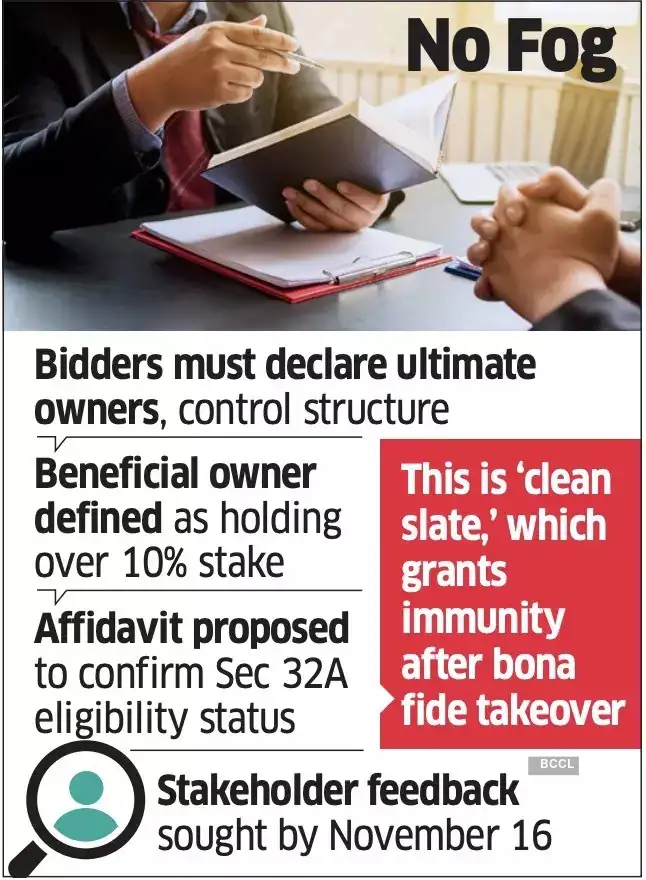Insolvency board proposes rule to reveal beneficial owners behind bids for bankrupt firms

The insolvency regulator has proposed mandating bidders for bankrupt firms to disclose beneficial ownerships, a move aimed at curbing misuse of the ‘clean slate’ principle and preventing backdoor entry of disqualified promoters or related parties. In a discussion paper, the Insolvency and Bankruptcy Board of India (IBBI) has suggested a standard format for beneficial ownership disclosures by all potential resolution applicants. Under the clean slate principle, enforced through Section 32A of the Insolvency and Bankruptcy Code (IBC), a stressed firm gets a fresh start after successful resolution. The provision grants immunity from prosecution for offences committed before insolvency proceedings, provided there is a bona fide change in management and control. “Effective implementation requires clear identification of persons who ultimately own or control the prospective resolution applicant,” the IBBI said in its paper. Some exemptions This is “so benefit of the ‘clean slate’ principle is not misused,” IBBI said. The beneficial ownership statement proposed by the regulator will cover “details of all natural persons who ultimately own or control the PRA (prospective resolution applicant), together with the shareholding structure and jurisdiction of each intermediate entity.” Bidders have to submit an affidavit as well in a specified format, stating they are eligible or ineligible for benefit of Section 32A of IBC. IBBI’s draft template for disclosure of beneficial ownership has been modelled on the regulatory framework prescribed by RBI under its updated Know Your Customer Direction. A company having a “controlling interest” (more than a 10% stake) in another firm directly or through one or more entities can be construed as a beneficial owner. However, where the bidder is a listed entity, it can be exempted from furnishing granular shareholder details if sufficient public disclosures of its shareholding and control are already available under Sebi regulations, the Companies Act, or equivalent overseas regulatory frameworks.
Some exemptions This is “so benefit of the ‘clean slate’ principle is not misused,” IBBI said. The beneficial ownership statement proposed by the regulator will cover “details of all natural persons who ultimately own or control the PRA (prospective resolution applicant), together with the shareholding structure and jurisdiction of each intermediate entity.” Bidders have to submit an affidavit as well in a specified format, stating they are eligible or ineligible for benefit of Section 32A of IBC. IBBI’s draft template for disclosure of beneficial ownership has been modelled on the regulatory framework prescribed by RBI under its updated Know Your Customer Direction. A company having a “controlling interest” (more than a 10% stake) in another firm directly or through one or more entities can be construed as a beneficial owner. However, where the bidder is a listed entity, it can be exempted from furnishing granular shareholder details if sufficient public disclosures of its shareholding and control are already available under Sebi regulations, the Companies Act, or equivalent overseas regulatory frameworks.
 Some exemptions This is “so benefit of the ‘clean slate’ principle is not misused,” IBBI said. The beneficial ownership statement proposed by the regulator will cover “details of all natural persons who ultimately own or control the PRA (prospective resolution applicant), together with the shareholding structure and jurisdiction of each intermediate entity.” Bidders have to submit an affidavit as well in a specified format, stating they are eligible or ineligible for benefit of Section 32A of IBC. IBBI’s draft template for disclosure of beneficial ownership has been modelled on the regulatory framework prescribed by RBI under its updated Know Your Customer Direction. A company having a “controlling interest” (more than a 10% stake) in another firm directly or through one or more entities can be construed as a beneficial owner. However, where the bidder is a listed entity, it can be exempted from furnishing granular shareholder details if sufficient public disclosures of its shareholding and control are already available under Sebi regulations, the Companies Act, or equivalent overseas regulatory frameworks.
Some exemptions This is “so benefit of the ‘clean slate’ principle is not misused,” IBBI said. The beneficial ownership statement proposed by the regulator will cover “details of all natural persons who ultimately own or control the PRA (prospective resolution applicant), together with the shareholding structure and jurisdiction of each intermediate entity.” Bidders have to submit an affidavit as well in a specified format, stating they are eligible or ineligible for benefit of Section 32A of IBC. IBBI’s draft template for disclosure of beneficial ownership has been modelled on the regulatory framework prescribed by RBI under its updated Know Your Customer Direction. A company having a “controlling interest” (more than a 10% stake) in another firm directly or through one or more entities can be construed as a beneficial owner. However, where the bidder is a listed entity, it can be exempted from furnishing granular shareholder details if sufficient public disclosures of its shareholding and control are already available under Sebi regulations, the Companies Act, or equivalent overseas regulatory frameworks.economictimes




